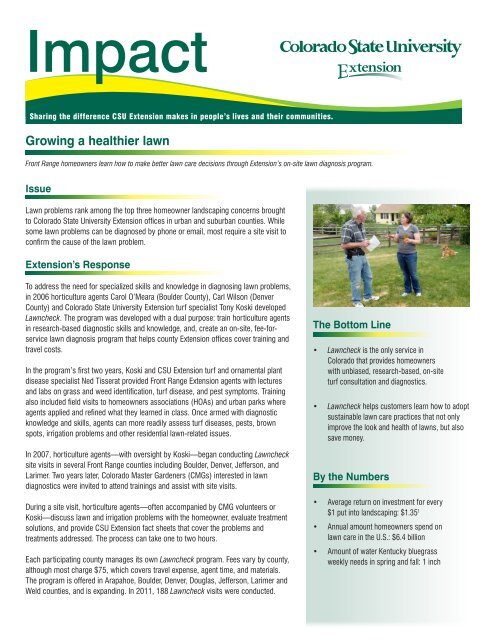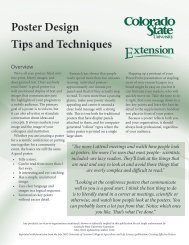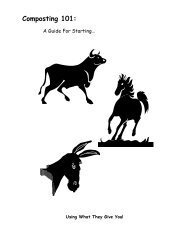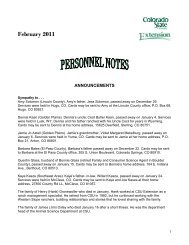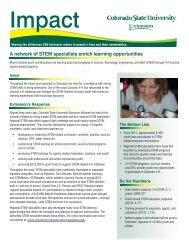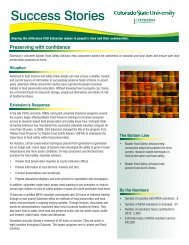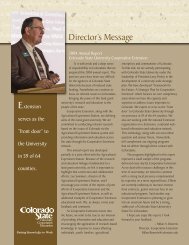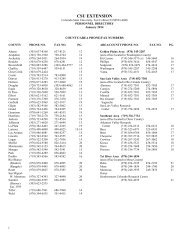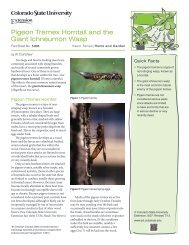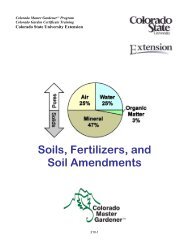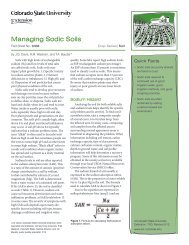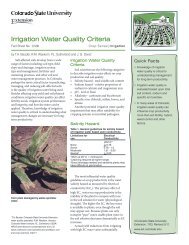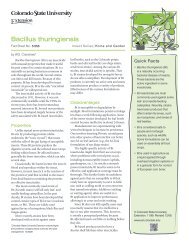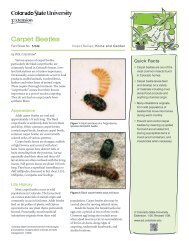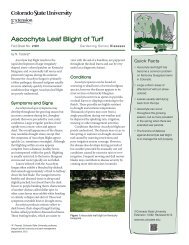Growing a healthier lawn - Colorado State University Extension
Growing a healthier lawn - Colorado State University Extension
Growing a healthier lawn - Colorado State University Extension
Create successful ePaper yourself
Turn your PDF publications into a flip-book with our unique Google optimized e-Paper software.
<strong>Growing</strong> a <strong>healthier</strong> <strong>lawn</strong><br />
Front Range homeowners learn how to make better <strong>lawn</strong> care decisions through <strong>Extension</strong>’s on-site <strong>lawn</strong> diagnosis program.<br />
Issue<br />
Lawn problems rank among the top three homeowner landscaping concerns brought<br />
to <strong>Colorado</strong> <strong>State</strong> <strong>University</strong> <strong>Extension</strong> offices in urban and suburban counties. While<br />
some <strong>lawn</strong> problems can be diagnosed by phone or email, most require a site visit to<br />
confirm the cause of the <strong>lawn</strong> problem.<br />
<strong>Extension</strong>’s Response<br />
To address the need for specialized skills and knowledge in diagnosing <strong>lawn</strong> problems,<br />
in 2006 horticulture agents Carol O’Meara (Boulder County), Carl Wilson (Denver<br />
County) and <strong>Colorado</strong> <strong>State</strong> <strong>University</strong> <strong>Extension</strong> turf specialist Tony Koski developed<br />
Lawncheck. The program was developed with a dual purpose: train horticulture agents<br />
in research-based diagnostic skills and knowledge, and, create an on-site, fee-forservice<br />
<strong>lawn</strong> diagnosis program that helps county <strong>Extension</strong> offices cover training and<br />
travel costs.<br />
In the program’s first two years, Koski and CSU <strong>Extension</strong> turf and ornamental plant<br />
disease specialist Ned Tisserat provided Front Range <strong>Extension</strong> agents with lectures<br />
and labs on grass and weed identification, turf disease, and pest symptoms. Training<br />
also included field visits to homeowners associations (HOAs) and urban parks where<br />
agents applied and refined what they learned in class. Once armed with diagnostic<br />
knowledge and skills, agents can more readily assess turf diseases, pests, brown<br />
spots, irrigation problems and other residential <strong>lawn</strong>-related issues.<br />
In 2007, horticulture agents—with oversight by Koski—began conducting Lawncheck<br />
site visits in several Front Range counties including Boulder, Denver, Jefferson, and<br />
Larimer. Two years later, <strong>Colorado</strong> Master Gardeners (CMGs) interested in <strong>lawn</strong><br />
diagnostics were invited to attend trainings and assist with site visits.<br />
During a site visit, horticulture agents—often accompanied by CMG volunteers or<br />
Koski—discuss <strong>lawn</strong> and irrigation problems with the homeowner, evaluate treatment<br />
solutions, and provide CSU <strong>Extension</strong> fact sheets that cover the problems and<br />
treatments addressed. The process can take one to two hours.<br />
Each participating county manages its own Lawncheck program. Fees vary by county,<br />
although most charge $75, which covers travel expense, agent time, and materials.<br />
The program is offered in Arapahoe, Boulder, Denver, Douglas, Jefferson, Larimer and<br />
Weld counties, and is expanding. In 2011, 188 Lawncheck visits were conducted.<br />
The Bottom Line<br />
• Lawncheck is the only service in<br />
<strong>Colorado</strong> that provides homeowners<br />
with unbiased, research-based, on-site<br />
turf consultation and diagnostics.<br />
• Lawncheck helps customers learn how to adopt<br />
sustainable <strong>lawn</strong> care practices that not only<br />
improve the look and health of <strong>lawn</strong>s, but also<br />
save money.<br />
By the Numbers<br />
• Average return on investment for every<br />
$1 put into landscaping: $1.35 1<br />
• Annual amount homeowners spend on<br />
<strong>lawn</strong> care in the U.S.: $6.4 billion<br />
• Amount of water Kentucky bluegrass<br />
weekly needs in spring and fall: 1 inch
Impact<br />
Lawncheck is the only program of its kind in <strong>Colorado</strong> that performs on-site turf<br />
consultation and diagnostics that help customers (homeowners, HOAs, businesses<br />
and more) learn how to improve their <strong>lawn</strong> care practices. These might involve:<br />
making changes to their watering, mowing and cultural practices; repairing<br />
malfunctioning sprinkler systems; selecting different turfgrass species; controlling<br />
weeds; decreasing pesticide use; and, many others.<br />
The program has accrued many benefits for the public as well as <strong>Extension</strong><br />
volunteers, including:<br />
Improved <strong>lawn</strong> quality through unbiased, reliable information<br />
• According to Koski, people turn to CSU <strong>Extension</strong> for Lawncheck because they’ve<br />
been told one thing by a <strong>lawn</strong> service company and want a second opinion. “They<br />
really trust us for the right information,” Koski says. “We have saved people<br />
from making very expensive decisions like re-sodding their <strong>lawn</strong>, or using a <strong>lawn</strong><br />
service company, or spraying fungicide–all when they don’t need to.”<br />
• Clients have reported greener, thicker grass, reduced necrotic ringspot disease,<br />
and regrowth of dead and bald spots after overseeding.<br />
Potential reduction in water and pesticide use<br />
• According to Koski, water management issues, such as overwatering and faulty<br />
sprinkler heads, are the most common source of residential <strong>lawn</strong> problems.<br />
• A large proportion of landscape irrigation water is directed to <strong>lawn</strong>s making them<br />
an easy target for criticisms of landscape water waste. The majority of site visits<br />
includes recommendations to water more efficiently, use fewer pesticides, and<br />
fine-tune the type and amount of fertilizer applied, and its timing. Reduced inputs<br />
save money.<br />
• According to Boulder County <strong>Extension</strong> agent Carol O’Meara, these behavior<br />
changes can lower phosphorous run-off into local watersheds and help conserve<br />
municipal water supplies.<br />
Improved <strong>Colorado</strong> Master Gardener curriculum & confidence<br />
• As a result of increased interest in turf/<strong>lawn</strong> diagnostics, the overall CMG<br />
volunteer training curriculum has been expanded to address symptoms and<br />
solutions to residential <strong>lawn</strong> care problems.<br />
“Lawncheck can help homeowners<br />
save money, but, perhaps more<br />
importantly, it helps them come away<br />
with a much better understanding<br />
of how to sustainably care for their<br />
<strong>lawn</strong>.”<br />
– Carol O’Meara<br />
Boulder County <strong>Extension</strong> horticulture<br />
and entomology agent<br />
“The neighbors come to me for<br />
advice because I had such dramatic<br />
improvement in the appearance of my<br />
<strong>lawn</strong>. As a result, our neighborhood<br />
has learned a lot about proper<br />
watering and fertilization.”<br />
– Lawncheck client<br />
“I think that confidence has filtered<br />
down from agents to our volunteers.<br />
As a result, everybody is more<br />
confident about diagnosing turf<br />
problems.”<br />
– Tony Koski<br />
CSU <strong>Extension</strong> turf specialist<br />
• Experienced CMGs may also participate in advanced plant diagnostic training that<br />
extends beyond <strong>lawn</strong> issues to include disease and pest issues associated with<br />
trees, shrubs and other common residential plants.<br />
1<br />
Figure reported by Associated Landscape Contractors of <strong>Colorado</strong>, as appeared in Journal of Environmental<br />
Horticulture (2010).<br />
Contact Information<br />
<strong>Colorado</strong> <strong>State</strong> <strong>University</strong> <strong>Extension</strong>, U.S. Department of Agriculture and <strong>Colorado</strong> counties cooperating.<br />
<strong>Extension</strong> programs are available to all without discrimination. September 2012. Written by Carol Busch.<br />
Tony Koski<br />
CSU <strong>Extension</strong><br />
Specialist, Turf<br />
(970) 491-7070<br />
tony.koski@colostate.edu


